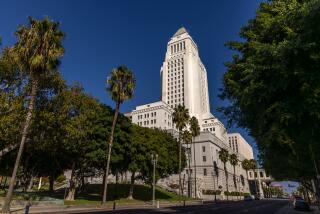Panel to Urge Wider Labor Crime Focus
- Share via
WASHINGTON — The President’s Commission on Organized Crime will recommend today that the government develop a broad-based strategy to remove organized crime from the nation’s marketplace instead of concentrating on the corruption of certain unions and labor leaders, The Times learned Monday.
In a report that the commission’s chairman, Judge Irving Kaufman, will deliver to President Reagan, the panel is urging that Atty. Gen. Edwin Meese III develop the national strategy after conducting an industry-by-industry analysis of markets believed to be influenced by organized crime, sources familiar with the report said.
The commission says its investigation uncovered organized crime involvement not only in unions but in trade associations and legitimate and illegitimate businesses.
Gambino Family Trial
The full report, however, will not be released immediately to avoid causing a mistrial of a car theft ring and murder conspiracy trial in New York involving nine reputed members of the Gambino crime family.
The sources said that drafts of the full report include information gleaned from court-authorized wiretaps of the Gambino organization, including one of Paul Castellano, its alleged boss until he was gunned down in mid-town Manhattan on Dec. 16.
Instead, the panel is expected to distribute only its findings and recommendations today. It is not clear when the detailed material will be made public, because other organized crime trials are scheduled in New York that might be affected by the so-called Title III, or electronic surveillance, disclosures, the sources said.
Fundamental Changes
In addition to calling for development of a national strategy, the commission says there should be fundamental changes in the structure and operations of the two agencies with principal responsibilities in attacking marketplace corruption--the Justice and Labor departments.
The panel said that the Justice Department should view the corruption of businesses by organized crime as seriously as it does the underworld’s corruption of unions and urged that the department’s antitrust division be committed to the fight against organized crime.
“The expertise of the division in antitrust matters is essential to the success of the marketplace strategy,” the commission says in the report. The federal wiretap law should be amended to permit electronic eavesdropping against organized crime groups that engage in antitrust offenses, the commission proposes.
Conflict of Interest Seen
In the panel’s view, the Labor Department’s shortcomings in rooting out economic corruption stem from its being required to police the same constituency it represents. To correct this “inherent conflict of interest,” the commission says, the department’s enforcement functions should be separated from its “friend-of-labor” functions.
A division should be created to consolidate the department’s authority to investigate criminal violations--authority that has been weakened by spreading it among several divisions, the commission says.
The new unit should be headed by a presidentially appointed assistant secretary, who would report regularly to the President through the attorney general and to Congress on the status of racketeering influence in unions and union welfare funds, the commission recommends.
Agents of the newly created division should be empowered to execute search warrants, arrest suspects and assist in conducting electronic surveillance--powers that the department’s agents now do not have, the panel says.
Harsher Penalties Sought
In other recommendations, the commission’s labor report calls for:
--Judges to impose harsher penalties on labor racketeers and to signal to corporations that bribes to union officials will be dealt with severely.
--Payment of excessive salaries under collective bargaining agreements to be disallowed or prosecuted criminally.
--The Securities and Exchange Commission to take a greater hand in denying organized crime access to capital markets.
--The AFL-CIO to act against unions identified in trials, congressional hearings and other proceedings of public record as influenced or controlled by organized crime.
More to Read
Sign up for Essential California
The most important California stories and recommendations in your inbox every morning.
You may occasionally receive promotional content from the Los Angeles Times.













